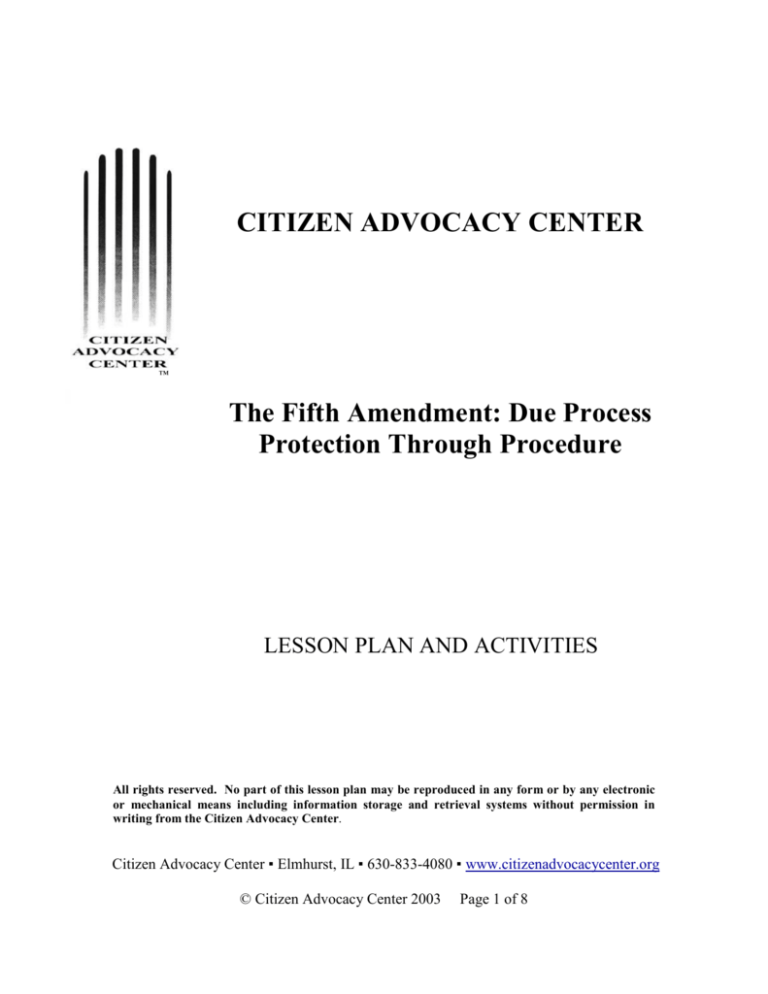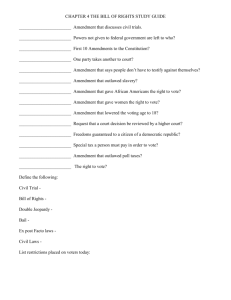
CITIZEN ADVOCACY CENTER
™
The Fifth Amendment: Due Process
Protection Through Procedure
LESSON PLAN AND ACTIVITIES
All rights reserved. No part of this lesson plan may be reproduced in any form or by any electronic
or mechanical means including information storage and retrieval systems without permission in
writing from the Citizen Advocacy Center.
Citizen Advocacy Center ▪ Elmhurst, IL ▪ 630-833-4080 ▪ www.citizenadvocacycenter.org
© Citizen Advocacy Center 2003
Page 1 of 8
Funding for lesson plans was provided to the Citizen Advocacy Center by the McCormick Foundation.
The Fifth Amendment
Lesson Plan and Activities
Grade Level: 9, 10, 11, 12
Subject(s):
• Social Studies: United States Government, State Government, Local Government; and
• Language Arts: Reading, Writing.
Duration: 1-2 class sessions
Description: This lesson explores the meaning of the phrase “due process” in the Fifth
Amendment to the U.S. Constitution and how due process affects students’ daily lives.
Goals:
Illinois Learning Standards
A. Social Science: 14A, 14B, 16A, 16B; and
B. English/Language Arts: 1A, 1B, 1C, 3A, 3B, 3C; 4A; 4B.
Objectives:
1. Explore the definition of “due process.”
2. Understand the language of the 5th Amendment to the US Constitution.
3. Connect how the concept of due process affects students’ daily lives.
Materials:
1. “What Does the Fifth Amendment Say?” Handout
2. “Fifth Amendment Case Studies” Handout
3. “Fifth Amendment in a Nutshell” Handout
4. Dictionaries
Instruction and Activity:
1. Read the Fifth Amendment to the U.S. Constitution aloud to your students. Have them follow
along with their own copy (see handouts):
(1) “No person shall be held to answer for a capital, or otherwise infamous crime, unless on a
presentment or indictment of a Grand Jury, except in cases arising in the land or naval forces, or
in the Militia, when in actual service in time of War or public danger; (2) nor shall any person
be subject for the same offense to be twice put in jeopardy of life or limb; (3) nor shall be
compelled in any criminal case to be a witness against himself, (4) nor be deprived of life,
liberty, or property, without due process of law; (5) nor shall private property be taken for
public use, without just compensation.”
Citizen Advocacy Center ▪ Elmhurst, IL ▪ 630-833-4080 ▪ www.citizenadvocacycenter.org
© Citizen Advocacy Center 2003
Page 2 of 8
2. The Fifth Amendment to the U.S. Constitution includes the due process clause. Have the
students use dictionaries to help brainstorm what “due process” means and make a list.
•
Due process refers to our right in this country to be treated fairly through the use of
certain procedures if we are accused of a crime (such as use of the Miranda Rights
warning as seen on TV crime dramas). Every government action dealing with the public
has a proper process that the government must use to do almost anything – arresting
someone, searching a person’s property, taking a person’s land, changing zoning
requirements, etc. Due process refers to the proper process or procedure that ensures that
the government acts fairly when dealing with its citizens.
Hypothetical situations to get the students thinking:
• For example, would it be fair if a student was accused of cheating in this class and was
expelled from school without getting a chance to tell his or her side of the story? How
about if you were accused of stealing your friend’s backpack – should you just be
suspended from school and thrown in jail right away without being allowed to talk with
your parents or a lawyer, or even have a hearing or a trial?
• What do you think would be fair for the principal or your teacher to do in these
situations?
3. The phrases in the Fifth Amendment give us a list of some of the things the government has to
do if we are accused of a crime. All of these requirements are part of due process.
Activity One:
Split up the class into 5 groups, each taking a phrase of the amendment. Give each group a few
minutes to come up with what they think their phrase requires the government to do (dictionaries
may be used). A member from each group will need to take notes and report back to the rest of
the class what was discussed.
Teacher Key:
1. “No person shall be held to answer for a capital, or otherwise infamous crime, unless on a
presentment or indictment of a grand jury . . .”
• The government must officially charge you with a crime to make you answer for it. In
other words, they have to have a good reason to keep you in their custody – the police
cannot throw you in jail indefinitely without charging you with a crime and seeing it
through to trial. ** Please note that this situation has changed significantly with passage
of the USA PATRIOT Act, and the detention of “enemy combatants.” However, these
types of detentions are currently being fought in court on the basis of Fifth Amendment
due process challenges.**
2. “nor shall any person be subject for the same offense to be twice put in jeopardy of life or
limb”
Citizen Advocacy Center ▪ Elmhurst, IL ▪ 630-833-4080 ▪ www.citizenadvocacycenter.org
© Citizen Advocacy Center 2003
Page 3 of 8
•
Double Jeopardy refers to the right not to be tried twice for the same offense. The crime
in question is the SAME crime – same person, same date, same time, same place, same
manner.
3. “nor shall be compelled in any criminal case to be a witness against himself”
• This is the clause about your right against self-incrimination. “I plead the fifth!” means as
a defendant, you do not have to testify at all and you do not have to give any information
that might be used against you. You have the right to remain silent.
• Ask the students if they’ve ever heard the police “read someone their rights” on TV or in
the movies. Can they name these rights? Answer: Right to remain silent; any statement
defendant makes may be used as evidence against him; the defendant has a right to the
presence of an attorney; if the defendant cannot afford an attorney, one will be appointed
for him or her prior to any questioning if defendant so desires.
4. “nor be deprived of life, liberty, or property, without the due process of law”
• The government cannot take your life (as in the death penalty), your freedom (lock you
up or detain you), or your stuff (belongings or home) without going through fair
procedures that help to make sure you are being treated fairly and are given a chance to
give your side of the story.
5. “nor shall private property be taken for public use, without just compensation.”
• The government can take your property (like the land on which your house sits) for a
public purpose like constructing a park or road, but they have to pay you a fair price for
it.
6. We are also guaranteed due process rights under the Sixth Amendment:
• Right to a trial by jury
• Right to an attorney even if you cannot afford one
Follow-up Questions:
1. Do you think these due process rights are important? Why or why not?
2. Are some of these rights more important than others? For example, couldn’t a person be
his or her own lawyer if he or she can’t afford one? What might be the problem with
that?
3. Why not just get rid of juries and have a judge always decide if defendants are guilty?
Citizen Advocacy Center ▪ Elmhurst, IL ▪ 630-833-4080 ▪ www.citizenadvocacycenter.org
© Citizen Advocacy Center 2003
Page 4 of 8
WHAT DOES THE FIFTH AMENDMENT SAY?
“No person shall be held to answer for a capital, or otherwise infamous
crime, unless on a presentment or indictment of a grand jury. . . . nor shall
any person be subject for the same offense to be twice put in jeopardy of
life or limb; nor shall be compelled in any criminal case to be a witness
against himself; nor be deprived of life, liberty, or property, without the
due process of law; nor shall private property be taken for public use,
without just compensation.”
1. “No person shall be held to answer for a capital, or otherwise infamous crime,
unless on a presentment or indictment of a grand jury”
______________________________________________________________________________
______________________________________________________________________________
____________________________________________________________
2. “nor shall any person be subject for the same offense to be twice put in jeopardy of
life or limb”
______________________________________________________________________________
______________________________________________________________________________
____________________________________________________________
3. “nor shall be compelled in any criminal case to be a witness against himself”
______________________________________________________________________________
______________________________________________________________________________
____________________________________________________________
4. “nor be deprived of life, liberty, or property, without the due process of law”
______________________________________________________________________________
______________________________________________________________________________
____________________________________________________________
5. “nor shall private property be taken for public use, without just compensation”
______________________________________________________________________________
______________________________________________________________________________
____________________________________________________________
6. BONUS: Read the Sixth Amendment and list another due process right
______________________________________________________________________________
__________________________________________________________________
________________________________________________________________________
Citizen Advocacy Center ▪ Elmhurst, IL ▪ 630-833-4080 ▪ www.citizenadvocacycenter.org
© Citizen Advocacy Center 2003
Page 5 of 8
Fifth Amendment Case Studies (based on actual case law):
1. Review the facts.
2. Have students work in small groups to articulate each party’s point of view/argument.
3. Give students time to elect representatives and debate both sides of the case to gain an
appreciation for the issues involved and to understand the other side’s point of view.
Each group will be assigned to debate for one side.
4. Review how the court actually decided the case.
Case Study #1
The police suspected that Joe committed a crime. The police picked up Joe from his house, took
him to the police station, and questioned him for the purpose of obtaining a confession. The
police did not tell Joe of his right to remain silent or of his right to consult an attorney. Instead,
the police told Joe that they knew that his friend, Bob, had helped Joe commit the crime (a
murder), and that Bob had confessed. When Joe denied that he had had any part in the murder,
the police handcuffed him and took him into an interrogation room. There, while he stood
handcuffed, he was questioned for four hours until he confessed. During the interrogation, the
police denied Joe’s request to speak to his attorney. The police also prevented Joe’s attorney,
who had come to the police station, from talking with Joe. At Joe’s trial, the State introduced
Joe’s confession as evidence against him.
1. What is the issue raised in this case relating the Fifth and Sixth amendments? In other words,
did the police do anything unconstitutional in their investigation?
2. If the police did do something wrong, should that affect the admissibility of the confession
evidence?
3. Discuss the arguments for why certain evidence should be excluded or included based on the
police conduct. What do you think the outcome should be?
4. Would your opinion change if Joe had confessed to committing the murder to the police after
being taken into custody, but before he was taken to the interrogation room?
Case Analysis:
Actual case: Miranda v. Arizona
U.S. Supreme Court, decided June 13, 1966
Right at issue: The right not to be compelled to become a witness against oneself. This is also
known as the right to remain silent. The Sixth Amendment right to an attorney was also an
important part of this case.
Held:
The Defendant, Miranda, was deprived of his rights under the Fifth and Sixth Amendments. By
forcing the confession from Miranda, the police violated the defendant’s Fifth Amendment right
to remain silent. The State of Arizona was effectively forcing the defendant to testify against
himself by obtaining the confession without first informing the defendant of his rights. The Court
Citizen Advocacy Center ▪ Elmhurst, IL ▪ 630-833-4080 ▪ www.citizenadvocacycenter.org
© Citizen Advocacy Center 2003
Page 6 of 8
decided the State also violated the defendant’s Sixth Amendment right to consult an attorney
when they prevented the defendant from contacting or obtaining an attorney during interrogation.
The Court decided the State also violated the defendant’s right to an attorney by preventing the
defendant’s retained attorney to consult the defendant during the interrogation.
Case Study #2
The rate of juvenile immigration into the United States has been increasing rapidly from the
1980s through today. These juveniles are often not accompanied by parents or other guardians.
Instead, the alien juveniles are arrested by a Department of Homeland Security Immigrant and
Customs Enforcement (ICE) agent and then detained in a camp similar to a prison pending a
deportation hearing if they have no legal guardian. Unlike other types of prisoners, juvenile
aliens do not have the right to be released into the custody of responsible adults who are not their
parents or guardians while they wait for a hearing. Because of federal regulations, alien
juveniles can only be released in to the custody of parents, close relatives, and legal guardians.
Therefore, many juvenile aliens are required to stay in the detention camps while they are
waiting to have a hearing.
Last week, Jimmy and Pietra (two juveniles) were caught trying to enter the county illegally.
Jimmy and Pietra’s parents are not able to come get them from the detention camp, and no other
relatives are available to help. Jimmy and Pietra want to be released into the custody of a foster
family instead of staying in the detention camp while they wait for their hearing. The ICE agent
denies Jimmy and Pietra’s request, and Jimmy and Pietra are kept in detention without any type
of hearing as to whether the detention is necessary or proper in the first place. Jimmy and Pietra
are required to stay in the detention camp until their deportation hearing is finished.
1. What is the issue raised in this case relating to the Fifth Amendment? (due process)
2. Do you think it is violation of the Fifth Amendment to keep immigrant minors under federal
detention camps while they wait for deportation hearings? Or do you think they should be in
foster care?
3. Should these juvenile immigrants be allowed to have a preliminary hearing to determine if
the detention is proper in the first place?
4. Do you think that immigrants have the same rights as citizens under the Fifth Amendment?
Would your opinion change if you were in the place of the minors located in these federal
government institutions that operate much like prisons?
Case Analysis:
Actual case: Miranda v. Arizona
U.S. Supreme Court, decided March 23, 1993
Citizen Advocacy Center ▪ Elmhurst, IL ▪ 630-833-4080 ▪ www.citizenadvocacycenter.org
© Citizen Advocacy Center 2003
Page 7 of 8
Rights at Issue: Due process, whether or not an illegal juvenile can be held without a hearing
pending a deportation hearing.
Held:
The Supreme Court held in this case that the INS (now known as the Department of Homeland
Security Immigration and Customs Enforcement) could have custody over the illegal alien
juveniles without a hearing without violating due process. The Court held that the rule did not
violate due process because the INS was not necessarily detaining the children, but rather taking
custody of them where there was no apparent person to act as a guardian. The Court also found
that the conditions of the centers in which the alien juveniles are held to be acceptable and
compliant with federal guidelines.
The Court also found that there is no constitutional or other right for alien juveniles to be
released into the hands of an unrelated private individual. The Court ruled that government
custody is not meant to punish the illegal immigrant children, but rather is connected to the
government’s interest in preserving the welfare of the child. The court also ruled that arresting
and holding the alien juveniles up to the time of a deportation hearing does not violate procedural
due process under the Fifth Amendment because the deportation hearing itself fulfills the due
process obligations of the federal government. The Court ruled the federal government in no
way violated the Fifth Amendment rights of the juvenile aliens.
Citizen Advocacy Center ▪ Elmhurst, IL ▪ 630-833-4080 ▪ www.citizenadvocacycenter.org
© Citizen Advocacy Center 2003
Page 8 of 8









